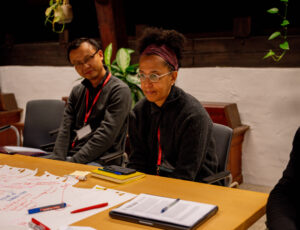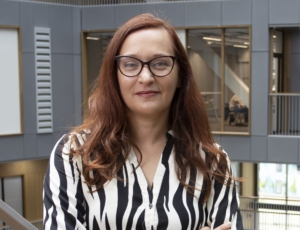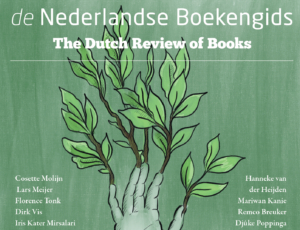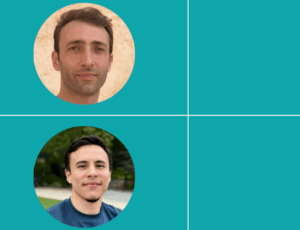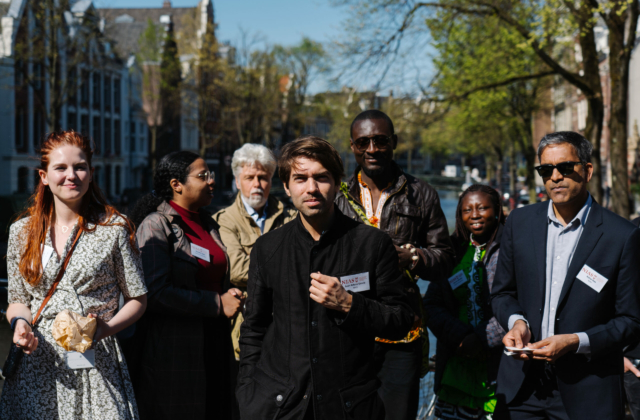
NIAS awards fellowship grants for the academic year 2024 -2025
18 June 2024Fellows get the opportunity to leave the academic treadmill, follow their curiosity, ask new questions, and to break new ground in their research.
The selection process involves a rigorous external review, emphasizing not only individual quality but also the importance of fostering a diverse range of viewpoints and the will to work together as a group and contribute to one another’s research.
Our vibrant fellows community of 2024 – 2025 consists of more than fifty fellows from a wide array of humanities and social science disciplines and from all over the globe. As part of our Safe Haven Fellowship Program (recently extended to the whole world), NIAS will host four scholars from Ukraine and two additional scholars at risk from Gaza, who are still in the selection process and will be announced shortly. Safe Haven Fellow Roman Nekoliak will try to answer the question to what extent documenting conflict-related crimes in Ukraine and advocating for accountability in such cases, produces results that comply with international law standards.
Harvard sociology professor Michèle Lamont plans to dig deeper into her research on notions of worthiness. She will work on her book on “Being Unseen” analysing claims for political recognition by “invisible” US and UK working class youth; environmental recognition by two indigenous groups in Oceania and Canada; and recognition at work for high tech creators in videogames and other fields.
The new NIAS-NIOD-KITLV fellowship “Moving objects, Mobilising Culture” enables four researchers and heritage practitioners from formerly colonised countries to access and conduct research on objects – whether defined as cultural, historical, ancestral, art or otherwise – which are currently (lost) in the Netherlands, as well as on related archives and documentation.
List of Fellows 2024/25 and their projects
- Daniela Agostinho – Archival encounters: colonial archives, curation and restitutive practices
- Nadia Aït Saïd-Ghanem – Cuneiform tablets in Dutch museums and the Iraqi-French antiquities dealer Ibrahim Elias Gejou – NIAS-NIOD-KITLV fellow
- Houssine Alloul – Ottoman envoys to Europe: negotiating difference in the diplomatic world, 1832-1914
- Panggah Ardiyansyah – Evocative fragments: archaeological knowledge production for Sendang Duwur and its dispersed objects – NIAS-NIOD-KITLV fellow
- Maria Barnas – Dust and paint – Artist in Residence
- Wike Been – The fragility of employers’ involvement in collective bargaining – Instituut Gak fellow
- John Boy – Urban Citizenship and Emerging Critical Technical Practices in Amsterdam – Urban Citizen fellowship
- Mita Choudhury – The wayward saint and the repentant historian
- Mark de Rooij – Logistic multidimensional data analysis
- Frank Dobbin – Do faculty diversity programs increase faculty diversity? Evaluating a quarter century of initiatives in the United States
- Caroline Fernandes Caromano – (Re) Interweaving past and present – NIAS-NIOD-KITLV fellow
- Benedikt Goderis – Modest but adequate? An empirical analysis of Dutch minimum income protection – Instituut Gak fellow
- Olivia Maria Gomes Da Cunha – On the impossibility of forgetting: runaways and refugees in the sentient maroon landscapes
- Philip Gorski – The fragmentation of the sacred: an alternative narrative of western modernity
- Mingtao Huang – China’s legislature-centred constitutional review system: promises, challenges and prospects
- Ying-Tzu Lin – Post-growth cookbook: re-appropriating Dutch food history towards knowledge co-production for envisioning a postgrowth diet in a contemporary urban Dutch context – Meertens Fellow
- Lesia Kulchynska – Visuality of violence during the Russo-Ukrainian war – Safe Haven fellow
- Yuliia Kurnyshova – Ethical subjects and the “post-justice” contenders: how to remain normative in times of war? – Safe Haven fellow
- Michele Lamont – “Being unseen:” workers, indigenous people and high tech experts in a globalizing world
- Julia Lajus – Arctic warming, the second International Polar Year, and political instability in the 1930s
- Theo Frids Marulitua – Reimagining Pustaha – NIAS-NIOD-KITLV fellow
- Eyo Mensah – Personal naming practices and environmental sustainability in Nigeria
- Oleksandra Moskalenko – Fiscal and monetary policies in wartime Ukraine: was it the path to a resilient economy with international assistance? – Duisenberg fellow
- Roman Nekoliak – Bridging the gap: examining NGO contributions to justice in Ukraine – Safe Haven fellow
- Toine Pieters – The magic bullet legacy and torpedo fallacy in medicine – Golestan fellow
- Petra Rethmann – The future of liberalism in Germany and beyond
- Conny Roggeband – The gendered face of autocratization
- Sharon Rose – African tone languages and musical pitch processing
- Kirwin Shaffer – The world through anarchist eyes: Latin American anarchism and global history
- Tabona Shoko – Indigenous religion and climate change mitigation in Zimbabwe
- Hanna Starkova – Internet memes in the context of the war in Ukraine – Safe Haven fellow
- Emir Suljagić – Voicing the silences over Srebrenica: an investigation of genocide before and beyond the mass graves
- Mathias Thaler – Other ends of the world are possible: exploring the arts and politics of environmental breakdown
- Leendert van der Valk – Atlas of the Dutch history of slavery – Journalist in Residence
- Andrés Felipe Vélez-Posada – Tropical Ingenuity. Environments of knowledge in early modern Spanish America
- Leonieke Vermeer – The autobiography of a queen: biographer’s goldmine or pitfall?
- Dirk Vis – I Tree – Writer in Residence
- Lauren Wagner – Intra-active methodologies: exploring entangled ethnography
- Erica Wald – Everyday empire: social life, spare time and rule in colonial India
- Shengyu Wang – A new immersive aesthetic in late nineteenth-century Shanghai
- Lucie White – Crisis and catastrophe: science-based policy justification under urgency and uncertainty
- Nikkie Wiegink – Frontier governance: corporate power, displacement and coal mines in Mozambique
- Paulien de Winter – Exploring the influence of group dynamics on street-level bureaucrats’ enforcement styles – Instituut Gak fellow
- Wijnand IJsselsteijn – Psychology and ethics of progressively lifelike embodiments in the metaverse (PEOPLE in the Metaverse) – Distinguished NIAS Lorentz fellow
NIAS Theme Group | Early Dutch commerce and indigenous landscapes
- Steve Mrozowski – Situating Sylvester Manor in the Dutch colonial world
- Tiina Äikäs – Decolonizing indigenous landscapes in the North
- Jonas Monié Nordin – The Dutch in the North: decolonizing Sámi-Dutch relations of the seventeenth century
- James Symonds – New worlds & new commodities: transformations of everyday life in 17th & 18th century Dutch Republic
